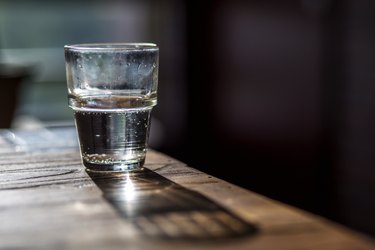
A morning beverage can help with rehydration after hours of sleep, get the brain firing again and help lay the foundation for a more productive day. When choosing among water, tea or coffee in the morning, consider which beverage is most beneficial to your overall health and hydration.
Tip
As long as you're rehydrating, you're getting a good start. However, whether the best morning beverage for you is tea, water or coffee might depend on your health goals as well as your individual preference.
Video of the Day
Read more: Best Juices to Drink in the Morning
Video of the Day
First Things First
After sleeping for many hours, the body has become dehydrated because you haven't been sipping on any liquid. If you're feeling brain fog, it's time to reach for a glass or mug and drink up right away. A study published in the November/December 2013 issue of ACSM's Health and Fitness Journal noted that even mild dehydration — a body water loss of 1 to 2 percent — can impair cognitive performance.
Even though coffee in the morning is a ritual for many people, you also can start meeting your daily hydration goals with a glass of water right away. According to the Harvard T.H. Chan School of Public Health, a group of nutrition experts from across the U.S. created the independent Beverage Guidance Panel, which recommends that at least half of your daily fluid should come from water.
If you like water, stick with it — it can be provide up 100 percent of your daily beverage needs. Many people understand the benefit of more water consumption, but wonder how much is enough. Harvard Health Publishing notes that most healthy people can simply let thirst be their guide.
Water is essential to keep your body going, has no common side effects and just two 8-ounce glasses taken before meals has been shown to be effective in weight loss and appetite control. Drinking more water is an easy way to give weight loss and maintenance goals a boost.
Coffee in the Morning
The coffee beans are ground, the water is getting hot and it's time for a daily cup of coffee in the morning. Plenty of other people are doing the same thing. According to the National Coffee Association, as cited by a September 2018 article published by Baruch College, City University of New York, 69 percent of Americans drink at least one cup of coffee a day. Many people are finding that a few cups of coffee can be an aid to an intermittent fasting regimen too.
Overall, though, the coffee news related to overall health is good, especially if it's consumed in moderation. In a study published in March 2019 in the American Journal of Clinical Nutrition, researchers studied 347,077 individuals in the United Kingdom and found no correlation between cardiovascular disease and drinking one or two cups of coffee per day. In fact, they found an elevated risk for non-coffee drinkers, drinkers of decaffeinated coffee and those who reported drinking more than six cups per day.
For many years, people with heart disease or other cardiovascular conditions were warned against drinking coffee, which is a significant source of caffeine, with 95 milligrams in each cup. However, new research in mice indicates that coffee could help the heart.
According to a study published in June 2018 in PLOS Biology, there's a specific cellular mechanism by which coffee consumption may improve heart health by promoting the movement of a regulatory protein into mitochondria, enhancing their function and protecting cardiovascular cells from damage. Research still needs to be done with human participants.
Read more: What to Drink and When to Drink It
What’s So Great About Tea?
Tea is enjoying growing popularity, as 80 percent of American households have some form of tea in the cupboard and more than 159 million Americans drink it every day. One increasingly popular tea choice is dieter's tea, which promises to boost metabolism.
Some tea lovers swear by mangosteen tea, which has been touted for its anti-cancer and anti-microbial properties. And those who favor the time-tested classics continue to reach for a refreshing "cuppa" English breakfast tea, which is still a good source of antioxidants.
No matter what kind of tea you're drinking, you can rest assured that it naturally contains flavonoids, which are the natural antioxidants found in plants. In green tea, you'll find aloscatechins, and in black tea, you'll be sipping theaflavins, but they've both been shown to be equally effective antioxidants.
A 2013 study in the journal_ Current Pharmaceutical Design_ showed that polyphenolic compounds present in green and black tea can help in prevention of cardiovascular diseases, as well as provide other benefits such as anti-aging and diabetes prevention.
- The BMJ: "Coffee Consumption and Health: Umbrella Review of Meta-Analyses of Multiple Health Outcomes"
- Current Pharmaceutical Design: "Tea and Health: Studies in Humans"
- Harvard Health Publishing: "Water and Health: Follow Your Thirst"
- Obesity: "Water Consumption Increases Weight Loss During a Hypocaloric Diet Intervention in Middle-Aged and Older Adults"
- PLOS Biology: "CDKN1B/p27 is Localized in Mitochondria and Improves Respiration-Dependent Processes in the Cardiovascular System"
- Harvard T.H. Chan School of Public Health: "Healthy Beverage Guidelines"
- ACSM Health and Fitness Journal: "The Hydration Equation: Update on Water Balance and Cognitive Performance"
- American Journal of Clinical Nutrition: "Long-Term Coffee Consumption, Caffeine Metabolism Genetics, and Risk of Cardiovascular Disease"
- Baruch College, City University of New York: "Wake Up and Smell the Coffee"
Is this an emergency? If you are experiencing serious medical symptoms, please see the National Library of Medicine’s list of signs you need emergency medical attention or call 911.